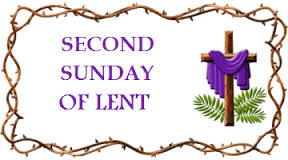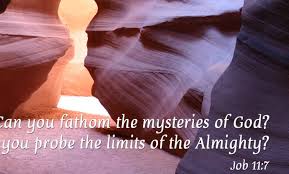
- 16th March 2025 -
 Gospel reading: Luke 9:28-36
Gospel reading: Luke 9:28-36
v28. Jesus took with him Peter and John and James and went up the mountain to pray.
 v29.As he prayed, the aspect of his face was changed and his clothing became brilliant as lightning.
v29.As he prayed, the aspect of his face was changed and his clothing became brilliant as lightning.
v30. Suddenly, there were two men there talking to him; they were Moses and Elijah
v31. appearing in glory, and they were speaking of his passing, which he was to accomplish in Jerusalem.
v32. Peter and his companions were heavy with sleep, but they kept awake and saw his glory and the two men standing with him.
v33. As these were leaving him, Peter said to Jesus,
"Master, it is wonderful for us to be here; so let us make three tents, one for you, one for Moses and one for Elijah."
He did not know what he was saying.
v34. As he spoke, a cloud came and covered them with shadow; and when they went into the cloud, the disciples were afraid.
v35. And a voice came from the cloud, saying:
"This is my Son, the Chosen One. Listen to him."
v36. And after the voice had spoken, Jesus was found alone.
The disciples kept silence and, at that time, told no one what they had seen.
***********************************
We have four commentators available from whom you may wish to choose .
Michel De Verteuil : Holy Ghost Priest, director of the Centre of Biblical renewal .
Thomas O'Loughlin: Prof of Hist Theology, Uni of Northampton.
Sean Goan: Studied scripture in Rome, Jerusalem and Chicago and teaches at Blackrock College and works with the Le Chéile Schools
Donal Neary SJ: Editor of The Sacred Heart Messenger and National Director of The Apostleship of Prayer.
**************************************************
Michel de Verteuil
Lectio Divina: The Year of Luke
www.columba.ie
General Comments
Though we usually refer to this incident as the 'Transfiguration', Jesus' appearing in glory was only the first stage of the experience the apostles had with him on the mountain. In your meditation then, feel free to enter the story at any stage, and even to remain with any part of the story that touches you, although you might also want to identify with the entire experience taken as a whole.
In verse 28, Jesus takes his three followers up the mountain to pray, and this is a symbol of the withdrawal that must take place before he can be transfigured.
In verses 29 to 31 the transfiguration is described as something that happened to Jesus himself first, before it was seen by the apostles. Note two points that are specific to St Luke's account:
• the change happens while he is praying;
• Moses and Elijah were speaking to him about his passion.
Verses 32 and 33 give us Peter’s response. St Luke stresses that it was because he saw them leaving that he wanted to make the tents.
In verses 34 and 35 we have a sharp contrast: the apostles who were covered by a cloud, now experience the glory of Jesus, not visibly but through a heavenly voice.
Verse 36 is a brief and sober conclusion to the episode.
Scripture reflection
Lord, commitment to a noble cause involves a long and painful journey:
~to practice non-violence in all our relationships;
~ to work for social transformation according to gospel values;
~ to live the evangelical counsels.
There is a first glorious moment when we are led by our leader up a mountain
~aspects are changed and ordinary garments become brilliant as lightning;
suddenly our great predecessors are with us and they are talking to us about the great victory that will soon come to pass.
It is wonderful for us to be there, and we want to make tents for ourselves.
But we do not know what we are saying,
because the words are barely out of our mouths
when a cloud comes and covers us with its shadow
~obstacles arise, we start to quarrel among ourselves, and some drop out.
~We feel a terrible fear as we go into the cloud,
but we need not be afraid because within that cloud we find our commitment.
It is as if from the cloud a voice comes from heaven
assuring us that we have perceived a personal call from God, and we must follow it.
From that moment on, we know that we can stand alone,
and we feel no need to tell others what we have seen,
because we no longer need their approval.
Lord, we who are leaders of communities, of families, of parishes, or the country,
we spend too much time and effort talking about love, respect and loyalty.
Teach us to do like Jesus, to take our community with us and go up the mountain to pray together, so that as we pray we may see the glory that is within us.
Our aspects will appear changed and outer appearances which seemed shabby will become brilliant as lightning.
Then suddenly we will become aware that we are in communion with our ancestors and we are preparing ourselves for the crises that we are about to face.
Lord, we remember today all those who will be attending parish missions during the coming weeks.
Often, they will come heavy with sleep and burdened with worries;
we pray that they may keep awake and see the glory of Jesus
and all the saints standing with him, so that they will say to him,
"Master, it is wonderful for us to be here."
"Prayer means yearning for the simple presence of God, for a personal understanding of his word, for knowledge of his will and for capacity to hear and obey him. "...Thomas Merton
Lord, help us not to be content in our prayer with glorious visions which make us feel wonderful to be there.
Teach us rather to yearn for deeper prayer, for your cloud to come and cover us with shadow while we enter into it, fearful and trembling,
and then, for your voice to come from that dark cloud, as we remain totally silent and experience that we must listen to the precious word you have spoken.
Lord, in our modern world, we have lost the art of listening to people.
Teach us to wait for another with reverence,
putting aside our prejudices, our personal plans and expectations,
as if a cloud has come and covered us with shadow,
and we have gone into the cloud with utter poverty,
knowing only that we must listen to this precious child of God
whom he has chosen out of all humanity to stand before us at this moment.
Lord, we thank you for deep experiences:
* moments of intimacy between spouses;
* an insight that changed our whole way of thinking;
* the times we feel at one with ourselves and with all creation.
After such experiences, we are like the three disciples
* we keep silence and can tell no one what we have seen.
"Before I understood prayer, the mountains were nothing but mountains,
and the rivers were nothing but rivers.
When I got into prayer, the mountains were no longer mountains,
and the rivers no longer rivers.
But when I understood prayer, the mountains were only mountains, and the rivers only rivers. " ...Zen saying
Lord, take us along that journey by which Jesus takes us with him up the mountain and we see his glory;
then we hear your voice saying he is your Son, the Chosen One,
and then after the voice has spoken he is found alone with us.

**********************************************
Thomas O'Loughlin,
Liturgical Resources for the Year of Luke
www.Columba.ie
Introduction to the Celebration
As we continue our Lenten journey towards Easter, we recall today the experience of the first disciples on their journey to the first Easter in Jerusalem. On a high mountain they beheld for a moment the glory of Jesus and heard the Father’s voice saying
‘This is my Son, the Chosen One, listen to him.’
Let us now reflect that, forgiven our sins, we may behold Christ’s glory in this celebration, and let us ask the Spirit to help us hear Christ’s voice in our lives.
Homily notes
1. This gospel challenges all the easy reductions that we make about Jesus:
The inspiring teacher, The compassionate preacher, The friend of the poor.
He is all these, but he is also
the One who comes from the Father,
the One who, we believe, was prepared for by the prophets,
the One who stands at the centre of history.
The transfiguration calls us to expand our religious horizons.
2. But the story has a curious comic element: the Lord of history is transfigured with these earlier prophets each side of him, and Peter wants to set up a campsite!
This shows the intimacy with which the human and the divine are present in Jesus: he is with his friends and interacts with them; he is present in the glory of God.
All handy distinctions such as
'high Christology' versus 'low', or 'immanence' versus 'transcendence'
are seen as too tied down to the limits of our understanding by this scene:
God is always greater, and what we can say about God is what we can see in Jesus.
3. Preaching must not try to 'explain' this scene, nor even to 'expand' upon it.
Rather the scene calls for our minds and imaginations to dwell on it and seek to make its 'picture' of the advent of God our own. So give a bit of the background that the first audience would have known, and then let imagination seek greater depths.
******************************************
3. Sean Goan
Let the reader understand
www.columba.ie
Gospel: Luke 9:28-36
The story of the transfiguration is told each year on this Sunday. This is because in each of the gospels it comes after Jesus has warned his disciples for the first time that he will be rejected in Jerusalem and suffer the ultimate penalty. There are, therefore, two aspects to the story of the transfiguration.
One is that it affirms Jesus' identity as the beloved of God despite the shadow of the cross that now hangs over his ministry.
The second is that it serves as a reminder to the disciples that their task as they accompany Jesus on the road to Jerusalem is to really listen to him. This puts our Lenten efforts into the right context as the sole purpose of the season is to bring us to a closer relationship with Jesus and to understand more fully the meaning of his passion, death and resurrection.

Reflection
Abraham is often called the father of faith, and attention is paid to his unquestioning willingness to do as God asks him. However, the story from today's reading shows that he also had doubts. This incident takes place at night, which may be symbolic of his desire to know how and where God is at work in his life. His doubts do not put a distance between himself and God; rather they are the impetus for a new stage in the relationship. All of us who are on the journey of faith experience times of doubt and darkness, but often these can be the very times God will show himself to us in unexpected ways. The events of Holy Week will demonstrate this in the fullest way possible.

***************************************************
Donal Neary S.J.
Gospel reflections
www.messenger.ie/bookshop
The real Jesus
 Things are not always as they seem. Underneath a church that I worked in, are a series of underground passages that go on for about a mile! People are the same - when you are talking to someone and they tell you they are very ill, or recovered from addiction, you see more to them. Or you may find out that someone you thought little of visits an elderly person every week. People are not always as they seem. The mountain visit was the same: the apostles saw Jesus - son of God, radiant in prayer, and in the middle of it all the Passion was announced. They saw the person behind the face.
Things are not always as they seem. Underneath a church that I worked in, are a series of underground passages that go on for about a mile! People are the same - when you are talking to someone and they tell you they are very ill, or recovered from addiction, you see more to them. Or you may find out that someone you thought little of visits an elderly person every week. People are not always as they seem. The mountain visit was the same: the apostles saw Jesus - son of God, radiant in prayer, and in the middle of it all the Passion was announced. They saw the person behind the face.
( There is more to Jesus than you might think.)
The big truth of Jesus is that he is intimately united to God the Father. So following him is not just action, but prayer that leads to action. We say someone is a great Christian - he or she helps the poor. Christianity is more - it is also prayer and the Eucharist. While we are thankful for the good lives of many people, we also can say that the full Christian life includes more, e.g. prayer, reflection, scripture reading, faith and Mass. It also involves community - the three were called to witness and help each other remember the Lord Jesus. Community brings the word of God alive in a real way. The community of the Church brings us to fuller faith.
 Prayer leads to action for others, and action leads back to prayer. We can be so close to heavenly things that we are no earthly good! Lent brings us into this mystery of the death and resurrection of the Lord - we are part of this, and we try to make life a grace for others. We can either transfigure the lives of others, or disfigure them. Let us be people of the transfiguration.
Prayer leads to action for others, and action leads back to prayer. We can be so close to heavenly things that we are no earthly good! Lent brings us into this mystery of the death and resurrection of the Lord - we are part of this, and we try to make life a grace for others. We can either transfigure the lives of others, or disfigure them. Let us be people of the transfiguration.
Lord show me your face - in myself and in others. Amen.